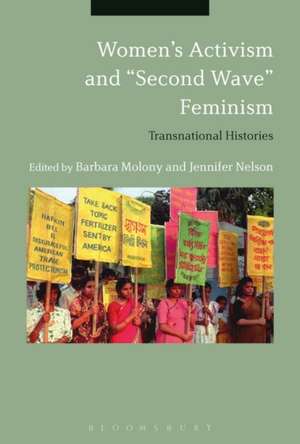Women’s Activism and "Second Wave" Feminism: Transnational Histories
Editat de Barbara Molony, Jennifer Nelsonen Limba Engleză Paperback – 18 sep 2019
| Toate formatele și edițiile | Preț | Express |
|---|---|---|
| Paperback (1) | 233.55 lei 6-8 săpt. | |
| Bloomsbury Publishing – 18 sep 2019 | 233.55 lei 6-8 săpt. | |
| Hardback (1) | 771.36 lei 6-8 săpt. | |
| Bloomsbury Publishing – 8 feb 2017 | 771.36 lei 6-8 săpt. |
Preț: 233.55 lei
Preț vechi: 298.52 lei
-22% Nou
Puncte Express: 350
Preț estimativ în valută:
44.69€ • 47.79$ • 37.26£
44.69€ • 47.79$ • 37.26£
Carte tipărită la comandă
Livrare economică 17 aprilie-01 mai
Preluare comenzi: 021 569.72.76
Specificații
ISBN-13: 9781350127708
ISBN-10: 1350127701
Pagini: 344
Ilustrații: 11 bw illus
Dimensiuni: 156 x 234 x 17 mm
Greutate: 0.48 kg
Editura: Bloomsbury Publishing
Colecția Bloomsbury Academic
Locul publicării:London, United Kingdom
ISBN-10: 1350127701
Pagini: 344
Ilustrații: 11 bw illus
Dimensiuni: 156 x 234 x 17 mm
Greutate: 0.48 kg
Editura: Bloomsbury Publishing
Colecția Bloomsbury Academic
Locul publicării:London, United Kingdom
Caracteristici
Reflects recent changes in the historiography of feminism, engaging with research on women's activism done outside the North American and European contexts
Notă biografică
Barbara Molony is Professor of History at Santa Clara University, USA. She is co-author of Gender in Modern East Asia (2016) and co-editor of Asia's New Mothers: Crafting Gender Roles and Childcare Networks in East and Southeast Asian Societies (2008) and Gendering Modern Japanese History (2005).Jennifer Nelson is Professor of Women, Gender, and Sexuality Studies at the University of Redlands, USA. She is the author of More than Medicine: A History of the Feminist Women's Health Movement (2015) and Women of Color and the Reproductive Rights Movement (2003).
Cuprins
Introduction Barbara Molony (Santa Clara University, USA) and Jennifer Nelson (University of Redlands, USA)I. Redefining Feminism 1. Hunger Doesn't Take a Vacation: The Food Activism of United Bronx Parents (Lana Povitz, New York University, USA)2. 'Sex-Ins, College Style': Black Feminism and Sexual Politics in the Student YWCA, 1968-1980 (April Haynes, University of Wisconsin-Madison, USA)3. Contemporary Feminisms and Controversies about the Principle of Secularity in France: A Model of Emancipation (Natacha Chetcuti-Osorovitz, Free University of Brussels, Belgium)4. SEWA's Feminism (Eileen Boris, University of California, Santa Barbara, USA)5. Feminist Dissidents in the 'Motherland of Women's Liberation: Shattering Soviet Myths and Memory (Rochelle Ruthchild, Davis Center for Russian and Eurasian Studies, Harvard University, USA)II. Reconsidering "Second Wave" Feminist Genealogies6. On the 'F' Word as Insult and on Feminism as Political Practice: Women's Mobilization for Rights in Chile (Jadwiga E. Pieper Mooney, University of Arizona, USA)7. Beyond the 'Development' Paradigm: State Socialist Women's Activism, Transnationalism and the 'Long Sixties' (Magdalena Grabowska, Polish Academy of Sciences, Poland)8. 'Making a Point by Choice': Maternal Imperialism, Second Wave Feminism, and Transnational Epistemologies (Priya Jha, University of Redlands, USA)9. Shared History and the Responsibility for Justice: The Korean Council for the Women Drafted for Military Sexual Slavery by Japan (Seung-kyung Kim, Indiana University-Bloomington, USA and Na Young Lee, Chung-Ang University, South Korea)III. Transnational Feminist Linkages 10. Mapping the Edges of Environmental Suburbia: Gender, Action, and the City in Late-Century California (Jeannette Alden Estruth, New York University, USA)11. The Politics and Possibilities of 'Difference' in Dalit Feminist Activism (Purvi Mehta, Colorado College, USA)12. One Thousand Wednesdays: Transnational Activism from Seoul to Glendale (Vera Mackie, University of Wollongong, Australia)13. Contesting the Nation(s): Haitian and Mohawk Women's Activism in Montreal (Amanda Ricci, McGill University, Canada)14. If Not Feminism, Then What? Women's Work in the African National Congress in Exile (Rachel Sandwell, University of the Witwatersrand, South Africa)Index
Recenzii
Makes an important contribution to the developing field, particularly in reconfiguring the history of women's activism away from western and white Eurocentric dominance. The book has a very wide reach, with fourteen chapters devoted to the histories of marginalised women across the globe, all of whom committed themselves to activism which benefited their communities in many different ways.
This volume succeeds admirably in rethinking the chronological and geographical scope, and the political textures, of "second wave" feminism around the world. Essays ranging from black college students in the YWCA redefining sexuality, to Soviet-era dissidents producing underground art and journals, to First Nation activists demanding sovereignty reveal early manifestations of what scholars later termed transnationalism and intersectionality. Each study is carefully grounded in time and place while contributing to a broad picture of global grass-roots activism.
This collection completely transforms our understanding of feminism by providing new frames through which to view its evolution as a global phenomenon. The book shows feminism's complex interactions with other major social trends and includes vibrant debate about the challenges posed by intersectional and transnational feminisms. Women's Activism and "Second Wave" Feminism brings together leading researchers in the field and is a vital resource for every reader seeking fresh perspectives on this significant force for social change in our times.
This innovative collection of essays will be of great value to scholars, teachers and students of History and Women's Studies. Taken together, the case studies suggest the value of widening our definition of the temporal and spatial scope of 'second wave' feminism, the importance of bringing together intersectional and transnational frames of analysis, and the value of starting from the local in studying the global history of women's activism.
Molony and Nelson have compiled a wide-ranging set of essays that offer fresh approaches to the study of transnational feminism and women's activism in the twentieth century. This volume covers a broad terrain, from Puerto Rican women's campaigns to ensure children's access to nutritious food in New York City schools to self-employed women's labor organizing in India. The essays in this book reveal the complexity and vitality of transnational feminism and also prompt readers to interrogate familiar categories of analysis in women's history.
This volume succeeds admirably in rethinking the chronological and geographical scope, and the political textures, of "second wave" feminism around the world. Essays ranging from black college students in the YWCA redefining sexuality, to Soviet-era dissidents producing underground art and journals, to First Nation activists demanding sovereignty reveal early manifestations of what scholars later termed transnationalism and intersectionality. Each study is carefully grounded in time and place while contributing to a broad picture of global grass-roots activism.
This collection completely transforms our understanding of feminism by providing new frames through which to view its evolution as a global phenomenon. The book shows feminism's complex interactions with other major social trends and includes vibrant debate about the challenges posed by intersectional and transnational feminisms. Women's Activism and "Second Wave" Feminism brings together leading researchers in the field and is a vital resource for every reader seeking fresh perspectives on this significant force for social change in our times.
This innovative collection of essays will be of great value to scholars, teachers and students of History and Women's Studies. Taken together, the case studies suggest the value of widening our definition of the temporal and spatial scope of 'second wave' feminism, the importance of bringing together intersectional and transnational frames of analysis, and the value of starting from the local in studying the global history of women's activism.
Molony and Nelson have compiled a wide-ranging set of essays that offer fresh approaches to the study of transnational feminism and women's activism in the twentieth century. This volume covers a broad terrain, from Puerto Rican women's campaigns to ensure children's access to nutritious food in New York City schools to self-employed women's labor organizing in India. The essays in this book reveal the complexity and vitality of transnational feminism and also prompt readers to interrogate familiar categories of analysis in women's history.











